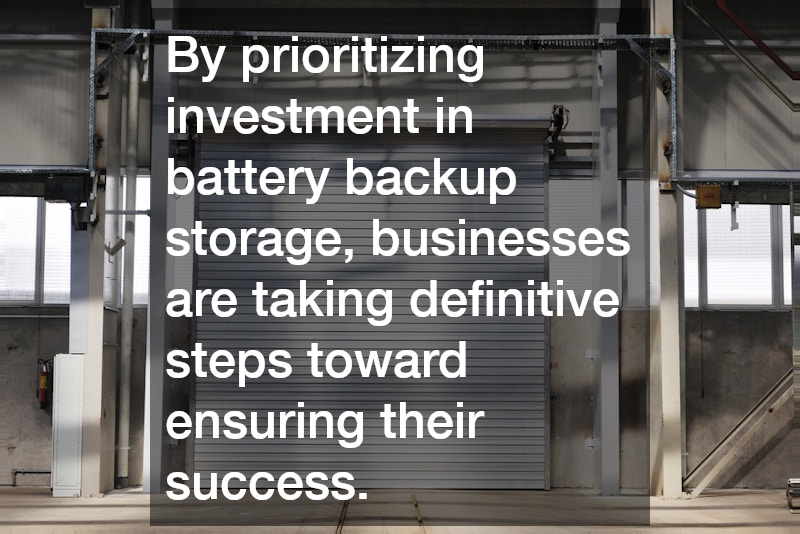In today’s rapidly evolving technological landscape, ensuring uninterrupted operations is crucial for the survival and success of modern businesses. Battery backup storage systems have emerged as an indispensable tool for maintaining continuity and protecting against unforeseen power outages. This article explores the various reasons why investing in battery backup storage is essential for enterprises striving to thrive in a competitive market.
The digital transformation has significantly increased the reliance of businesses on electronic systems and data-driven processes. Any disruption in power supply can lead to data loss, reduced productivity, and even financial setbacks. With the growing importance of seamless operations, battery backup storage solutions provide a reliable safeguard that ensures stability and enhances operational efficiency.
From small startups to large corporations, the impact of unexpected power interruptions cannot be underestimated. Businesses increasingly recognize the importance of battery backup storage to mitigate risks, enhance their resilience, and safeguard sensitive information. In this article, we delve into why battery backup storage is no longer a luxury but a necessity for modern enterprises.
Why Battery Backup Storage is a Necessity
Power outages and interruptions can strike without warning and disrupt business operations, leading to significant consequences. For companies relying on sensitive electronic equipment, these disruptions can range from minor inconveniences to major operational failures. Battery backup storage systems bridge the gap during such outages, ensuring critical systems remain operational until power is restored.
With the increasing digitization of business operations, the cost of downtime has become more pronounced. For instance, data-driven companies may experience losses running into millions of dollars for every hour of operational standstill. Investing in battery backup storage offers a cost-effective solution to prevent these losses by ensuring that essential services continue without interruptions.
Besides financial implications, reputational damage can also arise from frequent power-related disruptions. Reliability and consistent service are key factors customers consider when choosing a business partner. By utilizing battery backup storage, companies not only protect their bottom line but also ensure customer trust and loyalty remain intact.
How Battery Backup Storage Works
Battery backup storage systems, often referred to as uninterrupted power supplies (UPS), are designed to provide auxiliary power in the event of a main power failure. These systems are engineered to detect power loss and instantly switch to battery power, preventing any downtime in critical operations. For many businesses, this seamless transition is essential to maintain productivity and avoid data loss.
The technology behind battery backup storage is continually evolving, offering more efficient and sustainable options. Modern systems often come with features like energy management that optimize battery usage to prolong life and enhance reliability. As businesses grow increasingly aware of their carbon footprint, the advancement in green technologies within battery systems presents an attractive, eco-friendly solution.
Integrating battery backup storage involves various considerations, including power requirements, load capacity, and redundancy features. While the initial setup investment may seem significant, the long-term benefits greatly outweigh the costs. A comprehensive system ensures that all critical business functions remain uninterrupted and protected against unforeseen circumstances.
What Benefits Battery Backup Storage Offers
One of the foremost advantages of battery backup storage is the enhanced reliability it offers. In sectors like healthcare and finance, where precision and up-time are vital, these systems can be literally life-saving. Maintaining operations during a power outage ensures that critical data and services continue to be available, preventing catastrophic consequences.
Another significant benefit is energy efficiency and cost savings. Modern battery backup solutions often include energy-saving features that allow businesses to optimize utility consumption. By storing energy during low-demand periods and then discharging it during peak times, companies can leverage reduced electricity costs while minimizing strain on local power grids.
Additionally, businesses can gain a competitive edge by reassuring clients and partners of their resilience and preparedness for unexpected challenges. Reliable systems not only meet regulatory compliance in various industries but also enhance overall corporate reputation. These benefits underline why battery backup storage is no longer an optional investment but a business imperative in today’s dynamic market landscape.
By prioritizing investment in battery backup storage, businesses are taking definitive steps toward ensuring their success and longevity in an ever-evolving landscape. It is not just a strategic choice but a foundational element supporting future growth and stability.


